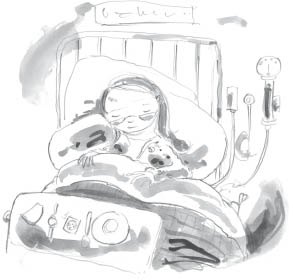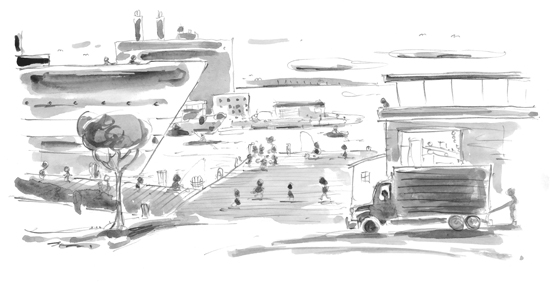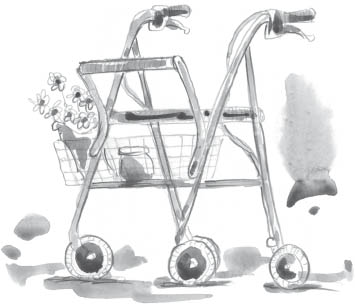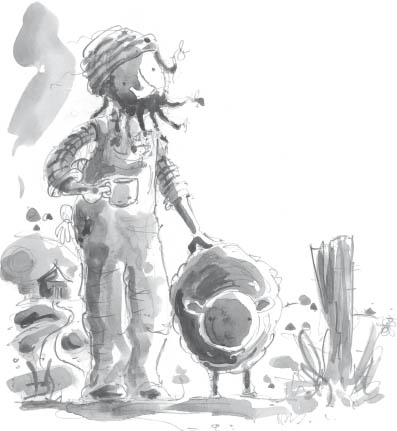
11. All That Was Wrong
Ben placed a chair close to the bed and offered it to Mr Jenkins while everyone took turns to tell Nell about the festival — being careful not to mention the dance.
Nell’s cheeks grew as pink as the roses on the carpet square at home and Perry wasn’t sure if it was because of Jenkins or because of the festival. From time to time, while everyone was talking, Nell’s eyes would close. The first time it happened, Perry pressed close to the bed and looked anxiously at Nell.
‘It’s all right,’ said Ben. ‘The nurses give Nell medicine so her leg won’t hurt so much and it makes her sleepy. But that’s a good thing, because sleep helps your body recover more quickly.’

When it was time for them to leave, the Rainbow Girls kissed Nell, Mr Jenkins held her hand, and Ben hugged his mum tight but tender, like a bear hugging its cub. Ben was taking them back to Cameron’s Creek, but Annie, Griffin, Layla and Perry stayed.
When Mrs Elliott learnt Layla was invited to go with them and to stay with Sunday and Sam, she remembered how, only days before, she had wished she was more like Annie. But telling the truth is not always easy and it was Layla who spoke first. She was brave and honest, true and gentle with her mother.
‘It’s okay, Mum,’ she said. ‘I know people don’t last forever. Nell says that’s why it’s so important to spend time with the ones we love. But Nell’s going to get better. I know she is. Only I think she might be homesick and I want to be with her.’
Mrs Elliott was proud of her daughter and glad she had fallen in love with the most uncommon family in Cameron’s Creek.

When visiting hours were over, Sam Sparrow met Annie, Griffin, Layla and Perry at the hospital and drove them to the apartment, where Sunday was waiting. They dressed themselves in coats and hats, left their overnight bags and went walking. Past factories, warehouses, shops and apartment blocks, and on towards the shining sea.

In that strange and wonderful place, made tiny by towering cargo ships, they sat on the splintery dock, with the blustering wind in their hair and seagull songs ringing in their ears. They ate hot fish and chips from paper parcels, licked salt from their fingers and watched old men with long curved rods reel whiting and seaweed in from the deeps.
Sunday and Sam’s apartment was small. There was a fold-down couch for Annie to sleep on, and for Griffin, Perry and Layla, mattresses and pillows on the floor. In Sam and Sunday’s room, there was a bed and a cot and a picture on the wall. It was a painting of an old dog and a small boy wearing a Superman costume. Annie’s signature was in the corner. When Perry first went to live with the Silks, Nell made him a Superman costume to help him feel braver. Now Perry had learnt to be brave without the suit. He remembered Annie painting the picture and giving it to Sunday to take home with her, the first time she came to the Kingdom of Silk.
‘It’s you,’ said Sam, smiling at Perry’s smaller self on the wall, like he was glad he was there. Then he said, ‘Sunday wants to tell you something.’
Sunday’s face was shiny and round like it was bursting with happiness when she said, ‘Sam and I are going to have a baby.’

That night, when the others were sleeping, Perry thought about Nell and the dance, and about Ben and the girls and Jenkins so far away, and about the new baby that was growing in the quiet dark in Sunday’s belly.
After a while, he crept up on the couch beside Annie and her arms went around him, safe and strong. He remembered back to long ago when he was nobody’s child. Every day when he woke up he would tell himself this might be the day when someone would take him home and ask him to stay and never leave. He was glad Sam and Sunday’s baby would never have to do that.

After the Silks went home again, there were many more long trips to and from home and the hospital, and in between there was school and preparing for the festival. But all the while, the townsfolk of Cameron’s Creek made sure Nell had plenty of visitors.
Mr Jenkins went three times a week. Scarlet, Anik, Grandma Mosas and the aunties took care of the Colour Patch Café one weekend so Mr and Mrs Kadri and their curly-haired children could visit Nell. They took a box of home-made rose-flavoured Turkish Delight. And when Elsie-from-the-post-office and the preacher went, Elsie took the book with the kingfisher cover and the shimmering silver-edged pages.
Nell didn’t sleep so much any more and when she had visitors she asked the nurses to pull the lever that made the end of her bed tilt up, so she could have meetings about the festival with her visitors, even though she was not strictly a committee member. When there were no visitors, physiotherapists took Nell to the hospital gymnasium, where she did special exercises to make her leg strong. Then they brought her a walking aid called The Intrepid. It was cherry red with wheels and brakes and a padded seat with a basket underneath. Nell lifted the seat and looked at the basket.
‘That will come in handy for putting vegetables in when I’m out in the garden,’ Nell told the physiotherapist. ‘And for library books when I’m visiting people at the old folk’s home.’
Day by day, Nell practised her walking, until she and The Intrepid became a familiar sight in the corridors of the hospital, and at last the doctors, physiotherapists and nurses told Ben that Nell might soon be able to go home.


Towards the middle of July, two visitors arrived at the Kingdom of Silk. They wore neat suits and name tags and arrived in a shiny white car on a day when the weather was a stampede of elephants, rumbling, grey and wet.
Perry, Griffin and Layla were on the raft in the middle of the dam, dressed in yellow raincoats and gumboots and sheltering under a polka-dot umbrella. On the bank, Blue was rounding up Fred and Ginger’s fifteen summer goslings, trying to persuade them to go for a swim. Fred and Ginger hissed and honked, Barney Blacksheep bleated, Blue barked, the children shouted and they didn’t hear the visitors’ car.
The driver stopped at the bottom of the hill. The passenger stepped out, picked her way across the puddles, opened the gate and closed it again after the car drove through. When it pulled up next to the Bedford, the car was no longer shiny and white.
Barney bulleted around the corner of Ben’s shed, wearing Griffin’s red rain hat at a jaunty angle. He planted his hooves on the car door and peered in the passenger’s side, trying to see through the soupy film of mud dribbling down the window. Barney Blacksheep was a very large sheep and his winter coat was as thick as a duck-down mattress. The visitors sat in their car and beeped the horn.
There must have been something that upset the visitors. Perhaps they were not used to all the glories of winter. Or they might never have met a man who sometimes forgot his daughters had plaited his beard and tied it with ribbons and bows, and who greeted his guests with a one-eyed black crow perched on his shoulder. Maybe they had never been to a home where twin goats, born too soon, were being kept alive in a laundry basket in front of the stove. Or perhaps it was the billowing blue tarpaulin that provided a temporary roof for the unfinished extension at the back of the house.

Whatever had upset the visitors, the Silks would never know. Ben, Annie and the children spent a whole hour walking through the house, listening to the visitors tell them what was wrong with it. They shook their heads and tut-tutted and marked paper sheets on their clipboards with thick black crosses.
They said the carpet with the pink cabbage roses was worn out and dangerous and the floor had too many ups and downs in unexpected places. Animals should not be permitted inside. Both the old black stove, the rocking chair beside it and the deep, deep bath with the lion’s feet should be replaced, they said.
When it stopped raining, the visitors went outside. They didn’t like the way the stuffing was coming out of the red vinyl couch on the veranda and said winding gravel paths in the secret garden were not desirable. Straight and concrete and neatly trimmed were preferred. Amber had made fairy bread and cream kisses for afternoon tea, but the visitors politely refused.
‘No, thank you. We have a long drive back to the city,’ Daryl the driver said.
‘What about Nell?’ said Annie. ‘When can she come home?’
‘Our priority is the safety of the patient,’ said the woman with the Cynthia badge on her chest.
‘We’ll need to do a further inspection to ensure all our recommendations have been acted on, before we can make a decision.’
Annie held Ben’s hand. He looked as though his heart was broken. The children, who had gathered beside their parents, linked hands like a small and crooked picket fence, protecting the home they loved. They stared after the muddied car as it drove away.